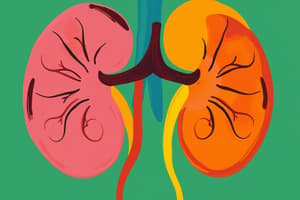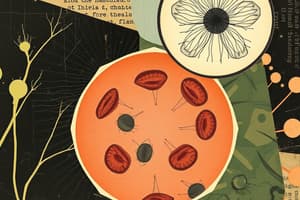Podcast
Questions and Answers
What is the primary function of the nervous system in plant and animal organisms?
What is the primary function of the nervous system in plant and animal organisms?
- Response to stimuli and integration of body functions (correct)
- Maintenance of homeostasis through chemical reactions
- Regulation of growth and development
- Transmission of genetic information
Which of the following is a characteristic of the nervous system in animals, but not in plants?
Which of the following is a characteristic of the nervous system in animals, but not in plants?
- Ability to respond to stimuli
- Involvement in regulating growth and development
- Ability to transmit signals through electrical impulses (correct)
- Presence of neurons and synapses
What is the primary function of the chemical control system in plant and animal organisms?
What is the primary function of the chemical control system in plant and animal organisms?
- Maintenance of homeostasis through hormonal regulation (correct)
- Transmission of genetic information
- Response to stimuli and integration of body functions
- Regulation of growth and development
Which of the following is an example of a chemical control system in plants?
Which of the following is an example of a chemical control system in plants?
What is the effect of an increase in auxin production on plant growth and development?
What is the effect of an increase in auxin production on plant growth and development?
Flashcards are hidden until you start studying
Study Notes
Plant Organ Systems
- Plants have two main organ systems: root system and shoot system
- Root system: responsible for absorbing water and nutrients from the soil, anchored to the soil, and stores food
- Shoot system: responsible for photosynthesis, supports the plant's growth, and produces flowers, fruits, and seeds
Animal Organ Systems
- Animals have 11 main organ systems: circulatory, respiratory, digestive, excretory, endocrine, nervous, musculoskeletal, integumentary, immune, reproductive, and urinary
- Each organ system has specific functions that work together to maintain homeostasis and ensure the survival of the organism
Chemical Control in Plants
- Plants use hormones to control growth and development
- Auxins: promote cell elongation and cell division, involved in apical dominance and root growth
- Gibberellins: promote stem growth and seed germination
- Cytokinins: promote cell division and differentiation
- Ethylene: regulates fruit ripening and senescence
Nervous Control in Animals
- Nervous system consists of central nervous system (CNS) and peripheral nervous system (PNS)
- CNS:composed of brain and spinal cord, integrates and processes information
- PNS: composed of sensory neurons and motor neurons, transmits information to and from the CNS
Chemical Control in Animals
- Endocrine system: uses hormones to regulate various bodily functions
- Hormones: chemical messengers produced by endocrine glands, transported through the bloodstream to reach target cells
- Examples of hormones: insulin, adrenaline, thyroxine, and growth hormone
- Functions of hormones: regulate metabolism, growth and development, and response to stimuli
Studying That Suits You
Use AI to generate personalized quizzes and flashcards to suit your learning preferences.




